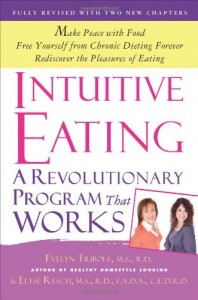Intuitive Eating
Written by Ashley Kelmore, Posted in Reviews
Three Stars
I’ve been on lots of diets, and have made many attempts to change up my eating to try to lose (or keep off) weight. Over the past couple of years, I’ve been reading more nutrition books (like last year’s “Good Calories, Bad Calories”) as well as a lot of articles and blogs about Fat Acceptance and Healthy At Every Size. The later repeatedly points out both how society has created all kinds of fucked up issues with food, and how in the US and other cultures we’re conditioned to value appearance (i.e., thinness) over actual health (which really cannot be determined just by weighing someone).
I heard about this book on one of those blogs, and while it’s definitely written in a manner that’s a bit more ‘chicken soup for the soul’ than I’d like, the message the authors (both professional dieticians who work with people with eating issues) are putting forth is interesting, empowering, and something I wish I’d been able to figure out on my own at some point.
The basic premise of the book is that, as the evidence points out, diets just don’t actually work. They don’t work for lots of different reasons, but in the end people blame themselves or their ‘willpower,’ and this leads to a cycle that, if you’ve been on more than a diet or two in your life, will seem pretty familiar. You decide to diet, you decide to cut out certain foods, you lose weight (or don’t), you eventually stop, and gain weight back, decide to diet, eat the forbidden food one last time, etc., forever. Now, of course there are people who diet, keep the weight off forever, and possibly enjoy saying things like “if I can do it, so can you!”, as though that’s somehow motivating as opposed to serving to make others just feel like they are weak or bad at life. This book is for the vast majority of us for whom diets won’t be the answer to being healthy.
So beyond pointing out the obvious, what does this book do? It seeks to help the readers to develop a health relationship with food, with the goal NOT of losing weight but of actually treating food as it should be treated. The authors want us to view food not just as fuel, but as pleasure as well (shocking, I know!). The authors want the readers to stop using food as a way to punish ourselves (carrots are good for you damn it, even if you hate them, EAT THEM) or to cover up our feelings. It’s a pretty radical approach for those of us who have struggled with food issues (although for those of you who never have, I’m willing to bet that it all seems extremely natural, which could be WHY you’ve never had food issues).
How does it purport to work? There are ten ‘principles,’ but the focus is not on perfection or failure; instead it wants you to focus on the process of slowly improving your relationship with food. As you go through this process, if you’ve had an unhealthy relationship so far, your weight should normalize, and part of the process is recognizing that a normal weight for you may not be the weight you’ve always dreamed of, and that’s OKAY. Again, kind of a radical thought, especially in a culture that spends so much time saying “if you work hard enough, you can do anything!” I can tell you right now, that unless I stopped eating for a year, removed some ribs and somehow shrunk the width of my pelvic bones, I’m never going to have they body of Gwyneth Paltrow. So why torture myself to get there?
The principles are: Reject the Diet Mentality, Honor Your Hunger, Make Peace with Food, Challenge the Food Police, Feel Your Fullness, Discover the Satisfaction Factor, Cope with Your Emotions Without Using Food, Respect Your Body, Exercise – Feel the Difference, Honor Your Health – Gentle Nutrition.
The book goes into much more detail, but the main points are that you should eat when you’re hungry, eat what you actually want to eat, stop when you’re full but enjoy your food, manage your emotions in other ways, and use exercise for health and movement, not for weight loss. Again, pretty straightforward, right? Except I’ve been working on this for just a week, and I’ve already started to recognize some things. I’ve really been tasting my food, and realizing that some things I eat because I’ve gotten used to them, not because I actually like them. I’m starting to actually eat when I’m hungry, and eat what I want, and I find that I’m eating more often, but usually eating less, and being MUCH happier with my food. Will I lose the 15 pounds I’ve gained since a stressful family event last summer? Maybe. Or maybe this is my normal weight. But I feel pretty confident that if I actually employ these suggestions I might actually be on the way to having that enviable healthy relationship with food some others already have.

